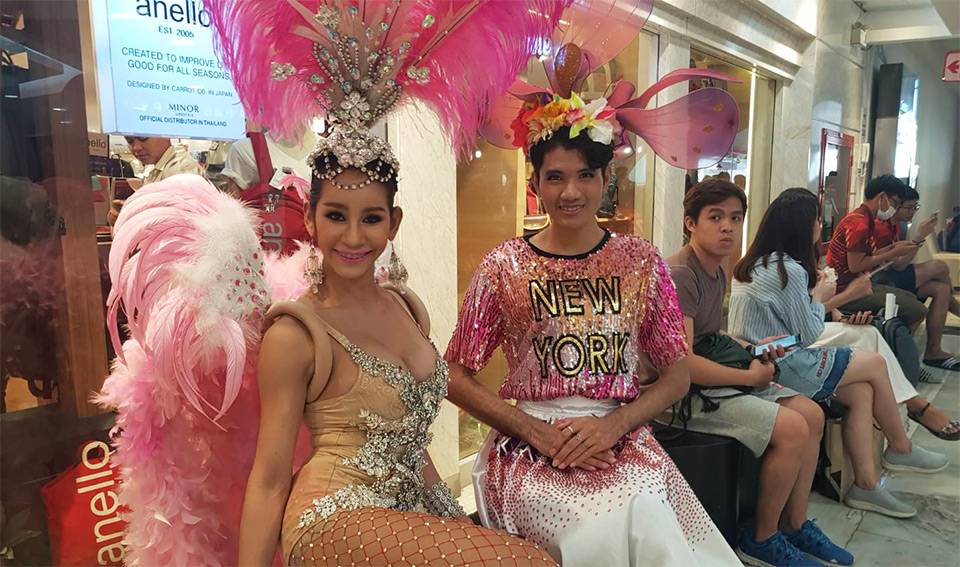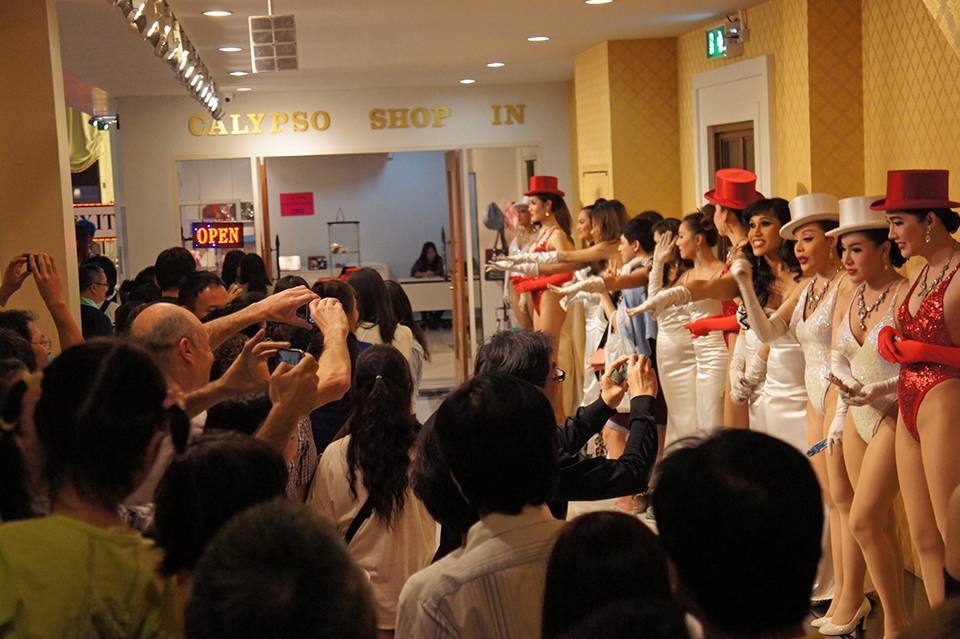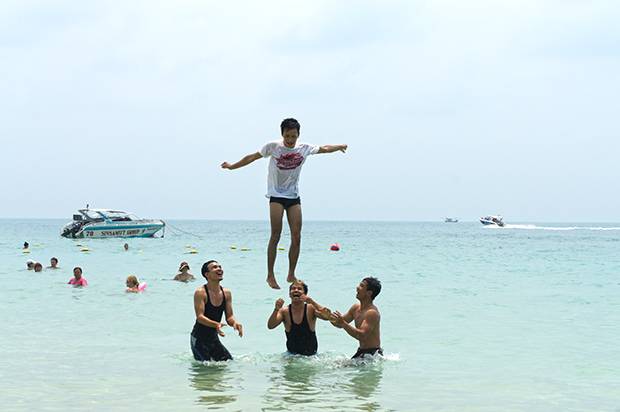Is Thailand a good destination for LGTBI travelers? Yes, definitely. Thailand is one of the best destinations in the world for gay tourism.
Obviously there is still room for improvement, but the attitude towards homosexuality in Thailand is quite open. I have been to quite a few countries, and in no other have I seen homosexuals live their sexual orientation so openly.
I have been to quite a few countries, and in no other have I seen homosexuals live their sexual orientation so openly.
In Thailand I have visited 4* and 5* hotels whose reception was managed by a transsexual. In my years as a Spanish teacher at various universities in Bangkok, I practically always had one or more transsexual students in my classes of between 10 and 25 people.
In Thailand’s primary and secondary schools, many children engage in behaviors that many would consider effeminate, and that’s not considered a cause for concern at all. It is considered just normal. Can you imagine all this in your country? In mine, Spain, I do not, despite the fact that Spain is one of the most advanced countries in these aspects… but there is still a long way to go before you can enter a 4* or 5* hotel in Spain and find a transsexual receptionist.
When I was teaching and had transgender students in class, it sometimes happened to me that I only realized when I read the student list and, before the student’s name, I would unexpectedly read a ‘MR’ when I expected to find a ‘MS’ instead. The reason is that, although in daily life in Thailand lesbians, gays and transgender people live with total normality, Thai law is not as liberal as most of the society.
In Thailand, homosexual marriage does not exist for now -although the debate over its legalization has been on the table for some time-. Furthermore, despite having one of the most advanced and modern sex reassignment industries -formerly called ‘sex change’-, and the best transsexual beauty pageants, gender reassignment is not legally allowed either. If you are born a man, your ID Card will always consider you a man, even if you have undergone all possible treatments and surgeries.

In short, Thailand is an ideal destination for gay tourists. I’d say it’s the best destination for them in all of Asia. Economically more developed countries such as Singapore, South Korea, Japan or Taiwan, do not have as high a social acceptance of LGTBI people as there is in Thailand. Undoubtedly, on this subject, Thai society gives a lesson in tolerance to the rest of the world.
I’d say it’s the best destination for gay travelers in all of Asia. Undoubtedly, on this subject, Thai society gives a lesson in tolerance to the rest of the world.
That said, I leave you with an article that the teacher and interpreter Albert Bosch, who has been living and working in Bangkok for over 15 years, has written for InThailand.Travel.
Gays in Thailand, an opinion by Albert Bosch
As in other countries, in Thailand’s LGTBI world good things coexist with bad things. And, like almost everything here, everything coexists with its contradictions, sometimes inescapable.
Homosexuality in Thailand and its contradictions
Yes, it is true that still today many Thais live in the closet, although I dare to estimate that they are a minority, especially among the younger generations. But transsexuals do not have any legal recognition regarding their sex change. That is institutional discrimination, period. Egalitarian marriage does not yet exist. More institutional homophobia. These issues need urgent improvement in Thailand, and it is not clear when or how they will be solved.
…transsexuals do not have any legal recognition regarding their sex change. That is institutional discrimination, period
However, this dark reality of the LGTBI world gets quite relativized by the advantages of the day to day life in Thailand.
The tolerance of Thai society means that gays, lesbians and trans -men and women alike- have a relatively free life to live and express themselves as they are. Yes, I have said ‘relatively’, because it will depend on which other reality we compare it with.
However, this dark reality of the LGTBI world gets quite relativized by the advantages of the day to day life in Thailand
We must wear in mind that we are in an Asian context, and that just a few kilometers in any direction outside of Thailand, these realities are other, much worse, for this collective. And it is also true that if we are to compare with more distant realities, it is possible that many Western countries enjoy better lives for their LGBTI community, especially at the level of legal recognition.
just a few kilometers in any direction outside of Thailand, these realities are other, much worse
Mainly for gay men, Thailand and especially Bangkok are a little paradise. And surely that is why Bangkok attracts millions of gay tourists, immigrants and expats in search of fun, a freer life or a relationship that in their countries of origin would be rejected, clandestine or simply impossible.
Thailand’s LGTBI world is more complex than it seems
However, for locals things are perhaps different, more complex than for foreigners. To consider the acronym LGTBI in Thailand from a Western prism will make us miss many details, or incur in many false beliefs.
Without going any further, the concept of western transsexuality tends to differ from the Thai kathoey (กะเทย). And it is that the kathoey, (trans women), sometimes misnamed ladyboys (what a horrible word!), have specificities that they do not share with their western trans counterparts.
For example, that they often do not consider themselves women but as a third gender, or that at one point in their life they can decide to live again as men. With globalization, perhaps these differences are perceived less and less, and the ‘trans’ concept gradually becomes a unifying term that includes this third gender, or ‘second type women’, as they are called in Thai.

The apparent acceptance of kathoeys actually has a cruel undertone. To get an idea, many Thais see in kathoeys (or in any form of non-normative sexuality) the Thai Buddhist belief that our current life is a product of how good or bad we behaved in previous lifes. A reward or a punishment. Thus, how good or badly we behave in this life will determine the next.
…many Thais see in kathoeys (or in any form of non-normative sexuality) the Thai Buddhist belief that our current life is a product of how good or bad we behaved in previous lifes.
This is probably the reason why people who experience misfortunes, sorrows or disorders are seen by other Thais with a mixture of compassion and fear. And that is precisely the case of kathoeys; having to live in a messy body, like a man who wants to be a woman, is perceived as a punishment for having engaged in an inappropriate sex behaviour in the previous life.
Although these are nothing but sensations or beliefs without much foundation, this can be extended to gay men, or to anyone who moves away from the heteronormative canon. Therefore, many people consider that these people are experiencing punishment, and behind this supposed acceptance, there is a feeling of “you must have done something wrong to deserve this.“

A common practice in Thailand is to mix gays and kathoeys, tarring them all with the same brush. One time I told a taxi driver that I was gay, and he asked me if I dressed as a woman or if I wanted to be a woman. When I told him that I didn’t he looked confused. He just couldn’t understand.
Over time I realized that in Thailand many think of gay and kathoey in the same way. They both end up being seen as tut (ตุ๊ด), a Thai word that defines someone who is considered effeminate, not a man, rather a funny subject, a histrionic joker who should not be taken very seriously.
Over time I realized that in Thailand many think of gay and kathoey in the same way
In fact, this type of discrimination is reinforced by the image that Thai media gives of gay men: frivolous, obsessed with any man who passes by, humorous and foul-mouthed. Something similar happens with kathoeys, with the addition that they are expected to be very good at something (usually they have to be very pretty, or very outstanding in some area), and that because they are special people, they are supposed to have the power to attract good luck or possess supernatural or esoteric powers.

Gays also have their own local specificities. The gay concept is actually imported from the West and is quite flexible, so it sometimes overlaps even with that of kathoey.
For example, a gay man in Thailand may say that he is not a ‘man’, meaning that he is not a heterosexual man. It doesn’t occur to me that a Western gay man would say the same thing, or accept that the term ‘male’ only applies to straight men.
Also, many gay people in Thailand tend to identify themselves strongly with an ‘active’ or ‘passive’ role, something that seems quite old-fashioned in the West, but not in Thailand. The reality may not be that simple, and in reality many gay Thais are versatile, but self-identification with an ‘active’ or ‘passive’ role will help them introduce themselves and relate to their gay friends in a particular way.
Do Thai gays come out of the closet in Thailand?
Thai people do not talk to the family about sex, so it is common that a homosexual man has never explained at home that he is. Surely behavior, friends, or the lack of girlfriends at a certain age will make it clear that the boy is gay, even if it is never verbalized.
For Thais from Chinese families, often more conservative, the fact of not being able to leave the family roof until marriage can create more uncomfortable situations. A change of city, to study or work, will be the perfect excuse to leave home and enjoy a freer life. On the other hand, succumbing to family desire, getting married and leading a double life, is something that can be found even among the young.

The famous Pride, the LGBTI parade celebrated in many parts of the world, has been interrupted in Thailand. Neither Bangkok nor Chiang Mai celebrate this type of event anymore, due to pressure from conservative groups that denounce these demonstrations as a lack of respect for Thai culture, and because of the low involvement of the local LGBTI collective.
Perhaps because very few feel proud of “not being a man”, or because being out in public is frowned upon in traditional Thai culture, the Pride parades of yesteryear have faded away. Instead, Songkran has become an unofficial Pride, drawing thousands of gays from all across Asia during the week of parties and splashy street water fights.
Instead, Songkran has become an unofficial Pride, drawing thousands of gays from all across Asia

Lesbians: Toms and Dee
The importance of clearly marked roles is very strong among lesbians as well. The masculine and the feminine.
The duality of tom (‘butch’) and dee (which comes from the English lady) was the norm in the Thai lesbian world until a few years ago. Some kind of emulation based on heterosexual relationships, in which one played the role of a man and the other of a woman. Behavior, clothes, everything showed in an extremely clear way that one was more masculine than Arnold Schwarzenegger, and the other more feminine than Hello Kitty.

However, over time Thai lesbian relationships have diversified, and today you can see relationships of two toms, two dees, or even a tom and a kathoey, something perhaps unheard of in other countries.
Toms should not be confused with transsexual men, who also exist although they are scarce and have very little visibility. They want to live as men, and perhaps they do resemble the concept of transsexual that we have in the West.
Learn more: have a look at our article about 15 cultural things you should know when traveling to Thailand




